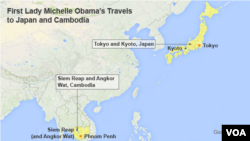First Lady Michelle Obama embarks on a five-day Asia trip Wednesday to launch the Obama Administration’s initiative "Let Girls Learn," promoting the education of millions of girls worldwide. Ahead of her stops in Japan and Cambodia, Obama and her husband said the inability of an estimated 62 million girls to attend school worldwide should be a foreign policy priority.
The first lady wrote in The Wall Street Journal that the fact that tens of millions of girls are not being adequately educated is more than “a tragic waste of human potential. It is also a serious public health challenge, a drag on national economies, as well as global prosperity, and a threat to the security of countries around the world.”
Obama said that as of 2012, every developing region had achieved, or was close to achieving, gender parity in primary education. But, she added, a gender gap remains in secondary education, where girls are subjected to “the cultural values and practices that define, and limit, the prospects of women in their societies.”
'Let Girls Learn'
In launching the "Let Girls Learn" campaign earlier this month, the first lady said the Peace Corps, a U.S.-funded volunteer development agency, would play a key role.
"This effort will draw on the talent and energy of the nearly 7,000 Peace Corps volunteers serving in more than 60 countries. Through this effort, Peace Corps will be supporting hundreds of new community projects to help girls go to school and stay in school," she said.
"And, I want to emphasize that these programs will be community-generated and community-led. They will be based on solutions devised by local leaders, families and even, yes, the girls themselves."
At the same event, President Obama said his administration is making clear to partner countries this is a foreign policy priority.
"We know that, when girls are educated, they’re more likely to delay marriage. Their future children, as a consequence, are more likely to be healthy and better nourished. Their future wages increase, which, in turn, strengthens the security of their family, and national growth gets a boost as well," the president said.
"From a political standpoint and a security standpoint, places where women and girls are treated as full and equal citizens tend to be more stable, tend to be more democratic. So, this is not just a humanitarian issue. This is an economic issue and it is a security issue, and that’s why it has to be a foreign policy priority."
Japan
Mrs. Obama’s first stop is Japan, where she will meet Prime Minister Shinzo Abe and his wife, Akie. The Peace Corps and Japan’s equivalent, Overseas Cooperation Volunteers, will work together on the campaign.
Michael Cucek, an adjunct fellow at Temple University’s Institute of Contemporary Asian Studies in Tokyo, said the first lady’s visit is receiving wide press coverage. He said the visit is seen as buttressing the special U.S.-Japan relationship. He also said education has long been a personal priority of the Abes.
"Abe has long been involved in education policy, but, in addition, he and his wife run a charity that builds schools in Myanmar and they have been doing it actually for quite some time. So, it’s not really out of place for Akie-sama to come forward at this time to meet very publicly with Michelle Obama on this issue because she, herself, has been involved in it,” said Cucek.
The first ladies will meet with Japanese university students. Before leaving Japan, Obama will also stop in Kyoto to tour a Buddhist temple and Shinto shrine.
Cambodia
In Cambodia, senior director for Asia affairs at the U.S. National Security Council Evan Medeiros said, Obama will touch on the need for an open and inclusive political system and for allowing civil society to have a role in good governance. Human Rights deputy Asia Director Phil Robertson said Cambodia is a work in progress when it comes to girls’ education.
"And, in fact, we just released a report last week about the women and girls in the garment sector, which is the major export industry in Cambodia and over 92-percent of the work force in that industry are women and girls," Robertson said.
"We found that there are systematic abuses taking place in the garment factories in Cambodia that are sending products to the likes of Gap and others (corporations) overseas, and the problem that we found was girls are going into these factories and that, for all intents and purposes, is the end of their education.".
Robertson said many of the girls are driven to the factories because of food insecurity at home. The rights report said many of them face pregnancy discrimination and sexual harassment on the job. He said this issue should be on Mrs. Obama’s agenda in Cambodia. The Southeast Asian nation is one of 11 countries partnering in the "Let Girls Learn" campaign, along with Albania, Benin, Burkina Faso, Georgia, Ghana, Moldova, Mongolia, Mozambique, Togo and Uganda.
Mrs. Obama, the first U.S. firstlady to visit Cambodia, is scheduled to travel to Siem Reap where she will meet her Cambodian counterpart, Bun Rany, wife of Prime Minister Hun Sen, speak with students and volunteers and see some community programs said to be expanding girls’ education opportunities. Before returning to Washington, she is to visit the ancient temple at Angkor Wat.





